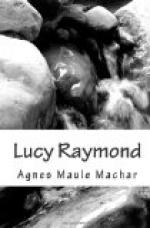After many kind parting salutations, and warm invitations from Mrs. Ford to come soon and spend an afternoon at the farm, the party took leave; one division proceeding homeward by the winding road, lying white in the full moonlight, as the fields were now wet with dew, while the others took the shortest cut to the river, where the boat was lying. Very little was said during most of the way, except some subdued exclamations of delight as they passed out from the deep shadow of the overhanging rocks into the broad river, which glittered in the moonlight like a sheet of dazzling silver, roughened by the slightest ripple, and past point after point of luxuriant foliage, looking dream-like and unreal in the light that silvered their glistening leaves.
As they neared the village, Lucy suddenly recollected their unexpected guest. “I wonder how Nelly got home! Did she stay long after we left, Alick?” she said.
“No; she said her mother would be angry if she were out late, so she set off at a run.”
“Lucy,” said Stella, “I wonder how you can have anything to do with such a vagabond-looking child! I’m sure she was watching to see whether she could pick up anything; and she looked just like a gipsy.”
“Oh, Stella! how can you be so suspicious?” exclaimed Lucy indignantly. “I don’t believe Nelly would do any such thing! No wonder the poor child was watching us while we were at tea; didn’t you see how hungry she was?”
“Well, I know we’ve had things stolen by just such children, and papa says it’s best to keep such people down; for they’re sure to impose on those who are kind to them, and charity is quite thrown away upon them.”
“A convenient belief to save trouble,” Lucy was just going to say, but wisely repressed the impulse, feeling that it would not sound very respectful to Stella’s father, who, she felt, must be a very different man from her own.
“Stella,” said Alick, “did it ever occur to you what you might have been if you had been left, motherless and almost fatherless, to run all day on the streets, listening to bad words and seeing all sorts of evil, without any one to say a kind word to you and teach you what is right? I wish you could have heard the poor little thing’s story as she told it to me.” And in a few words he gave them an outline of Nelly’s history.
“Papa says you never can believe their stories,” objected the city-hardened Stella.
“I know you can’t always,” replied Alick; “but I think I’m not easily taken in, and I’m willing to stake my judgment on this being no sham. And how would you have turned out from such a bringing-up, Mademoiselle Stella?”
“And where is her father?” Lucy asked.
“Oh, her father works on a boat, and is seldom at home. They came to live here because it is cheaper, and they can have a pig and raise potatoes.”
“I wonder whether she can read,” said Lucy.




